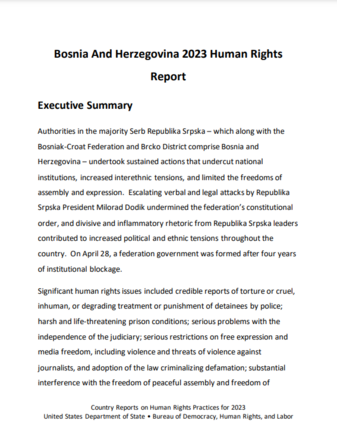
This study highlights in particular the behavior of the President of Republika Srpska and other authorities, which have exacerbated political and ethnic tensions, restricted free speech and undermined the country’s constitutional order.
The report delves into each section of civil rights and gives examples as well as an analysis of the progress in specific fields, e.g. the independence of the judiciary, freedom of association, freedom of religion etc… .
When it comes to freedom of expression, the report points out a growing number of challenges to press freedom and media professional standards. Intimidation, threats and pressures continue to be key factors that jeopardize the safety of the profession and journalists’ activities in Bosnia and Herzegovina. The BH Journalist Association recorded that the threats that journalists receive are often initiated by political figures and government officials. The study also stresses a rapid growth of gender-based attacks, with a high number of women journalists having received death threats and online hatred. Investigative journalism has been hindered by attempts at censorship, most of the time due to inappropriate and excessive political pressure. The political elite has also strengthened the control of national broadcasters, pressuring them to produce specifically tailored and biased news.
The number of libel cases and complaints continued to grow as well, following the re-criminalization of defamation by the ruling coalition of the entity of Republika Srpska. According to the Office of the UN High Commissioner, this had a very large impact on press freedom in the country: more and more journalists have been subjected to legal actions, which typically led to high financial demands.
Regarding other issues, e.g. the freedom to participate in the political process, the report notes specific irregularities in the national elections, especially in the run of the president of the entity of Republika Srpska. This also continued to be a severe problem in the country, largely affecting the formation of the government of FBiH.
Ongoing problems also concern growing obstacles to the work of NGOs and civil society organizations, especially in the entity of Republika Srpska.
Women are facing discrimination on a high basis at all levels. Although specific laws were introduced to ensure, for example, a better protection against rape, domestic violence and partners’ violence, their implementation needs significant improvements. Rights of minorities are undermined to a large extent, resulting in experiences of disrespectful and discriminatory actions.
Finally, reflecting on the economic condition and the situation of workers’ rights, the report highlights the need for substantial improvement in economic laws and measures, stressing the fact that the risk of poverty in 2023 impacted more than 30% of the total population.
Tags: Bosnia Herzegovina Freedom of expression Human rightsThe content of this article can be used according to the terms of Creative Commons: Attribution-NonCommercial 4.0 International (CC BY-NC 4.0) . To do so use the the wording "this article was originally published on the Resource Centre on Media Freedom in Europe" including a direct active link to the original article page.

